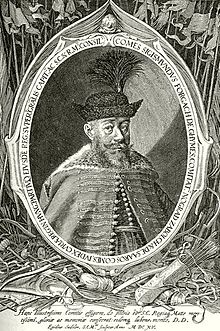Zsigmond Forgách
| Zsigmond Forgách | |
|---|---|
| Baron of Ghymes and Gács | |
 |
|
| Palatine of Hungary | |
| Reign | 11 May 1618 – 23 June 1621 |
| Predecessor | György Thurzó |
| Successor | Szaniszló Thurzó |
| Spouse(s) | Katalin Losonci Countess Zsuzsanna Thurzó Countess Katalin Pálffy |
| Issue | |
|
Full name
Baron Zsigmond Forgách de Ghymes et Gács
|
|
| Noble family | House of Forgách |
| Father | Baron Simon Forgách de Ghymes et Gács |
| Mother | Orsolya Pemflinger |
| Born | 1559 |
| Died | June 23, 1621 (approx. 62 years old) Nagyszombat, Kingdom of Hungary (today: Trnava, Slovakia) |
Baron Zsigmond Forgách de Ghymes et Gács, sometimes Sigismund Forgách (Slovak: Zigmund Forgáč; 1559 – 23 June 1621, Nagyszombat, today Trnava in Slovakia) was a Hungarian nobleman in the Kingdom of Hungary, who served as Palatine from 11 May 1618 to 23 June 1621.
The Forgách family was one of the eldest houses of Hungary. Zsigmond's parents were Baron Simon Forgách (died 1598) and Orsolya Pemflinger. His father functioned as Master of Cup-bearers. They had ten children (five boys and five girls), including Ferenc Forgách, Lord Chancellor and Archbishop of Esztergom, and Mihály Forgách, a soldier.
Zsigmond Forgách was born as a Protestant. He married three times, his wives were Katalin Losonci, Countess Zsuzsanna Thurzó and Countess Katalin Pálffy, with whom his eleven children were born (including Count Ádám Forgách, who served as, among others, Lord Chief Justice).
Baron Zsigmond had been in Polish king Stephen Báthory's royal court since 1583. He became a Royal Counselor in 1599. He converted to Catholicism under the influence of Péter Pázmány. He acquired huge lands by his marriages. He functioned as Lord Lieutenant (Count; comes) of Nógrád County between 1600 and 1621. He also served as Master of Cup-bearers from 1604 to 1607.
In 1604, he offered peace to Stephen Bocskay, leader of the Bocskay's War of Independence, but he was not authorized by King Rudolf or Crown Prince Matthias, so his offer was rejected. In 1605 at Kassa (today: Košice, Slovakia), he negotiated unsuccessfully, along with György Thurzó and Benedek Pogrányi, with the envoys of Bocskay.
...
Wikipedia
